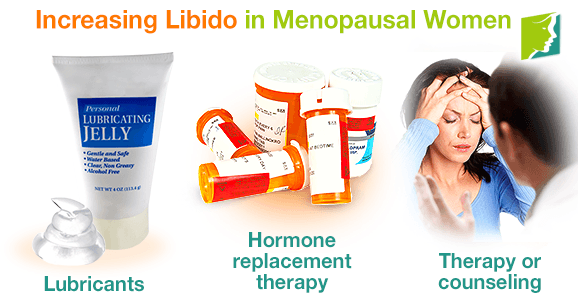Women going through menopause can experience many menopausal symptoms, including loss of libido. However, no matter what stage of life a woman is in, she deserves to have a satisfying and fulfilling sex life. Although the type of sex life a woman desires changes depending on who she is and where she is in her life, a woman's sexuality is always part of who she is. Changing levels of sexual desire should not be seen as a problem as a woman ages, unless they are lowering her quality of life.
Menopause and Decreased Libido
Sometimes a woman's natural libido returns once the menopausal transition is complete, and some women report a higher libido after menopause. Other women may experience decreased libido for the rest of their lives. However, a woman should not have to wait until she finishes menopause to have a libido that she wants.
Any woman who feels that increasing her libido will have a positive effect on her life should look into a number of treatments available to help increase libido in menopausal women. If a woman is experiencing a drop in her libido but does not see it as a problem, then naturally she need not seek treatment to increase it.
Treatments to Increase Libido in Menopausal Women
The following methods have been helpful for women, depending on the reasons behind their loss of libido.
Lubricants
If vaginal dryness or pain during sex is causing a loss of libido, it is a good idea to use a lubricant. Different types of lubricants can be purchased over the counter at pharmacies. Vaginal lubricants are meant to give temporary moisture to the vagina and can be used before sexual intercourse. Vaginal moisturizers are also available over the -counter and can be used throughout the day to keep the vagina moisturized and comfortable.
Hormone replacement therapy (HRT)
Low dosage hormone replacement therapy can be inserted directly into the vagina, which helps many women regain their libido and solves problems like vaginal dryness. It is recommended to use hormone replacement therapy that is applied directly to the vagina, such as a cream or vaginal ring. Other forms of HRT are spread throughout the body and therefore have a smaller impact on vaginal dryness and libido.
Therapy or counseling
Many women who experience depression, anxiety, or grief lose their libido. Stress, whether from problems at work or relationship issues, can also cause loss of libido. If you are suffering from any of these things, it is important to find someone you can talk to, whether a trusted friend or family member, counselor, or therapist.
Further Reading
Loss of libido can have many different causes, so there is a variety of treatments available that work differently depending on the woman. If loss of libido is lowering the quality of your life, it is important to talk to your doctor, who can offer you more specialized advice and treatment options.
Sources
- The North American Menopause Society. (2015). Vaginal and Vulvar Comfort: Lubricants, Moisturizers, and Low-dose Vaginal Estrogen. Retrieved from http://www.menopause.org/for-women/sexual-health-menopause-online/effective-treatments-for-sexual-problems/vaginal-and-vulvar-comfort-lubricants-moisturizers-and-low-dose-vaginal-estrogen
- National Health Service UK. (2014). Sex after the menopause. Retrieved from http://www.nhs.uk/Livewell/women4060/Pages/sex-after-the-menopause.aspx




